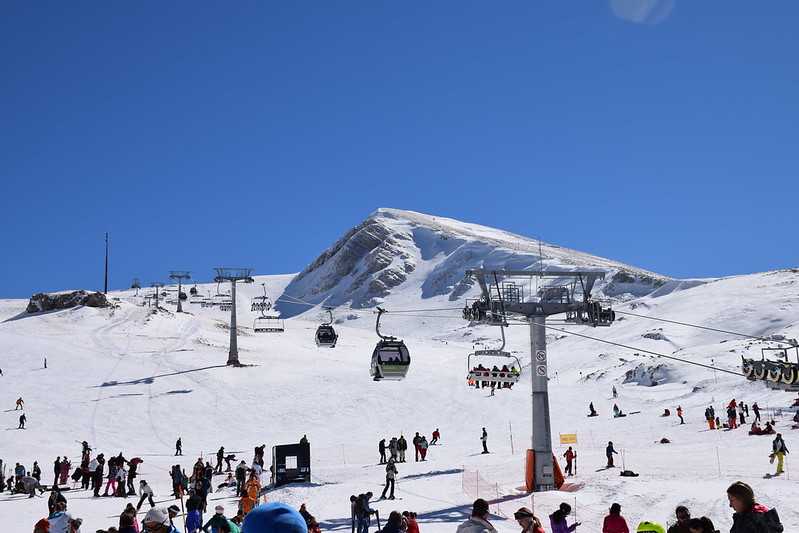While Greece is renowned for its Mediterranean beaches and ancient ruins, its winters reveal a different, often overlooked charm. Being a Mediterranean country, Winter in Greece is mild, with occasional showers and storms across the country, except in its northern parts. Northern parts of the country, including Thessaly, Macedonia, and Epirus, see some snowfall, making it a great option to ski in Greece.
Winter Weather in Greece

Winter in Greece typically spans from December to February, extending into March in some regions. The weather varies significantly across the country. In northern Greece, particularly in regions like Macedonia and Epirus, winter can be quite harsh, with temperatures often dipping to around 0°C and occasionally even reaching -20°C. Conversely, in southern areas, including Athens and the islands(Santorini, Mykonos, Zakynthos, etc), temperatures are milder, generally ranging between 12°C and 15°C. Despite the cooler weather, the southern parts often experience dry and sunny days mixed with occasional heavy rainfall.
Pros of Visiting Greece in Winter
- Fewer tourists and lower prices.
- Admission fees for Athens' major attractions and the National Museum of Archaeology are halved from November to March.
Cons of Visiting Greece in Winter
- While Santorini isn't officially close to tourism in winter, it's less convenient to reach. Fewer ferries run from Athens and between the islands, since locals mainly use the service.
- Many accommodations don't take bookings during the season as they carry out repairs.
- Many restaurants might be closed, so it's good to check in advance.
- Outdoor pools are often drained, and that hostel rooftop with a view of the Parthenon may be off-limits.
Does It Snow in Greece?

Yes, it does snow in Greece. While snow is rare in the southern parts and islands, it is more common in the northern regions and mountainous areas. The northern regions, including Macedonia and Epirus, frequently experience snowfall during the winter months. Iconic locations such as Mount Olympus and the Pindus mountain range are known for their snowy landscapes. In these areas, towns like Metsovo and Karpenisi become picturesque winter wonderlands.
Athens, although not typically associated with snow, does occasionally see light snowfall, particularly during extreme winters. However, such events are infrequent and usually brief. The Cyclades Islands like Santorini and Mykonos and other southern islands like Rhodes and Crete rarely experience snow.
Snow in Greece: Where to Go?
The likelihood of encountering snow in Greece varies by region:
- Northern Greece: Regions such as Macedonia and Thessaly often see more frequent and heavier snowfall. The Pindus mountain range is a prime location for snow-related activities. Metsovo Village in Epirus is renowned for its scenic winter landscapes and winter sports. Greece’s second-largest city, Thessaloniki, can occasionally experience snowfall, adding a wintery touch to its urban charm.
- Central and Southern Mainland: Areas like the Peloponnese can receive snowfall, particularly in mountainous locations like Mount Taygetos. The further you are from the coast, the higher the chances of snow. Famous for its monasteries perched atop towering rock pillars, Meteora is another location that looks breathtaking with a dusting of snow. You can also go to one of the most popular ski resorts in Greece, Parnassos Snow Center, which offers extensive facilities for skiing and snowboarding.
- Athens and Surrounding Areas: Snow in Athens is rare but not impossible. When it does occur, it’s usually a light dusting. Nearby mountain ranges like Mount Parnitha can offer fresh snow.
- Greek Islands: Snow on the Greek Islands is rarer but not unheard of. Islands like Crete, with mountainous terrain, can experience occasional snowfall. However, islands like Santorini rarely see snow due to their mild climate.
Skiing in Greece and Other Winter activities

Winter in Greece offers a chance to explore the country’s diverse offerings beyond its summer appeal. Here are some top activities and destinations to consider:
- Skiing and Snowboarding: Mount Parnassos and the Pindus mountain range provide excellent skiing opportunities.
- Exploring Mountain Villages: Enjoy the cozy atmosphere and traditional Greek hospitality in villages like Metsovo and Zagori.
- Historical Sites: Visit Athens and other historic locations like Meteora and the Peloponnese with fewer tourists and a tranquil atmosphere.
- Cultural Experiences: Savor hearty Greek cuisine in cozy tavernas and explore museums and cultural sites in cities like Thessaloniki.
What to Pack for a Winter in Greece

- Layers: Pack plenty of layers, including long-sleeve shirts, sweaters, and cardigans, to adapt to varying temperatures.
- Warm Coat: A good, insulated coat or jacket is essential, especially if you plan to visit northern Greece or mountainous areas.
- Raincoat/Waterproof Jacket: Greece can have rainy days in winter, so a waterproof jacket is handy.
- Pants: Bring a mix of jeans, trousers, and comfortable leggings.
- Warm Accessories: Hats, gloves, and scarves are necessary for colder regions.
- Footwear: Waterproof boots for rainy days, comfortable walking shoes for sightseeing, and perhaps a pair of dressier shoes for dining out.
- Umbrella: A compact, travel-friendly umbrella.
- Sunglasses: The winter sun can still be quite bright, especially with the reflective surfaces of ancient sites and snowy areas.
- Backpack/Daypack: For carrying daily essentials during excursions.
Winter in Greece offers a diverse range of experiences, from snowy mountain peaks and ski resorts to mild coastal regions. Whether you’re looking for winter sports or just want to experience the beauty of Greece under a blanket of snow, there’s something for everyone. Enjoy your winter trip to Greece!